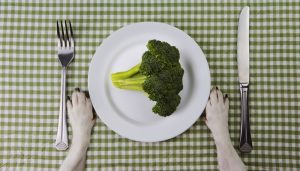
Table of Contents
As vegetarianism and veganism continue to grow in popularity, many people ask, what do vegans feed their dogs? Seeing how the majority of pet owners understand the importance of a meat-based diet for canines, this is a valid question. So, can dogs be vegan and stay healthy?
To start this off, let's first acknowledge that vegan dog food exists – both commercial brands, and homemade dog food recipes for a dog gone vegan or vegetarian. Vegan dog foods may be the least popular brands of pet food to ever exist, but they're out there.
But just as veganism is taking off, there's another well-established movement among pet owners on a completely opposite side of the spectrum – raw feeding, BARF diets, and simply high-meat-percentage diets.
Gone are the days of relying on dog chow as the “one-stop shop” for your pet’s diet. The drive to bring dogs back to a more natural, even ancestral way of eating is growing stronger among today’s pet owners, and frankly, kibble and canned wet food no longer make the cut.
Raw dog food diets are becoming increasingly popular, as are commercially available dry dog food options that are made with all-natural, organic ingredients. But can dogs be vegan? Let's take a look at the pros and cons of the vegan diet for dogs.
RELATED: Pros and Cons of the BARF Diet for Dogs
Can a Dog Be a Vegan or Vegetarian?
Why Turn to Veganism?
As the pet food industry continues to ruin its reputation through more dog food recalls and owners' understanding of the quality of commercial foods, many pet parents are turning to less common dietary options, the vegan diet being just one of them.
There may be several reasons to choose to feed your dog a vegan or a vegetarian diet. The most common reasons are either ethical, that is, if the owners have turned vegan to fight against animal cruelty, they wish the same for their dogs, or health-related reasons.
Dogs Can Be Vegans, Experts Say
It may surprise some, but experts say that dogs can definitely live on plant-based foods (if need be).
Generally, a vegan or vegetarian diet for dogs remains a subject of heated debates among pet nutritionists, animal scientists, and veterinarians. And yet, it's still a grey area that needs further exploration.
As for pet dogs, they can easily be converted to vegetarians, and if done properly, it is just as healthy as an omnivorous diet is for a dog.
Dr John Bauer, a veterinarian and professor of clinical nutrition at VetMed, explains how dogs are simply opportunistic carnivores and would often prefer meat over anything else.
However, when meat is not available (for example, for dogs in the wild during very cold seasons), dogs will definitely eat vegetables and plants to survive. Moreover, many vets have seen pet owners convert their dogs to become vegetarians without any issues.
Another veterinarian, Dr Cailin R. Heinze, wrote an article on the Cummings Veterinary Medical Center website about this subject, and she brings up some great points about the pros and cons of going vegan/vegetarian with dogs. She also notes how there are pets who did not do well on a vegan diet but explains why that's not a case against veganism.
One thing we often forget to consider besides the macronutrients themselves (i.e., protein, fats, and carbs) are all those other aspects that dogs get from their food and its composition, such as beneficial bacteria and enzymes.
We already know how crucial those things are in our own diet, but recent studies have shown the importance of this part of dog food as well. Many veterinarians have confirmed that we should be paying more attention and taking a closer look at this.
Dr Cailin R. Heinze, VMD, brings up some examples of recent research and notes how herbivore animals that eat hay and leaves (e.g., cows, horses, goats, etc.) actually have some bacteria found in their intestines that help to break down these foods. Dogs do not seem to have that bacteria.
So, can dogs be vegan, according to experts? While there's a lot of support from many veterinarians with regard to the vegan dog food diet, this still remains a grey area as we need more conclusive research to answer the question with more certainty. In the meantime, there appears to be a lot of anecdotal evidence from other pet owners who claim their dogs are doing better than the vegan dog food diet.
More Owners Are Making the Switch
Today, more than ever, plenty of pet owners are gradually making the switch towards the vegan dog food diet. While some may be doing this for ethical reasons, a large number are actually switching due to the allergies or ailments that their dogs are suffering from.
Many surmise that the uptick in these allergies (primarily skin allergies), degenerative diseases, and gastrointestinal issues is due to the meat byproducts in commercially available dog food. It's proven that commercial dog food brands often cause allergies in dogs, and meats are the main suspects (beef, lamb, and chicken being the most common causes of allergies). A vegan dog food diet seems to help dogs with these conditions.
But protein requirements must not be ignored.
Dogs need a significantly higher daily protein intake than humans do. Diets such as the raw dog food diet often require pet owners to invest in massive quantities of expensive meat to supplement the raw meals, all based on their dog’s nutritional needs.
But with a vegan dog food diet or a vegetarian diet for dogs, there are other meat substitutes that may provide enough protein for your dog.
So, can dogs go vegan? The bottom line here is that, biologically speaking, dogs are omnivorous. Just like humans, their bodies can successfully process both animal and plant nutrition to meet their dietary needs. While this remains a grey area, dogs certainly are NOT vegans, and it's possible to feed your pooch a vegan dog food diet.
How to Feed a Vegan Dog Food Diet
 Should you choose to go the vegan dog food diet route, it's important that the meals you prepare for your Fido be easily digestible and palatable. Without the guidance of your veterinarian, putting together a fully balanced vegetarian meal plan can be difficult and expose your dog to serious risks of malnutrition.
Should you choose to go the vegan dog food diet route, it's important that the meals you prepare for your Fido be easily digestible and palatable. Without the guidance of your veterinarian, putting together a fully balanced vegetarian meal plan can be difficult and expose your dog to serious risks of malnutrition.
Start the new diet very slowly.
With any dietary changes, the transition should be gradual so as not to cause intestinal distress. If switching from a meat-based diet to a vegan dog food diet, then you need to be particularly careful and slow. Increasing amounts of the new food should be mixed in with decreasing amounts of the old food until the new food can be incorporated fully.
It's generally advisable to extend the transition period to 1 month.
If you're switching to vegetarian dog food, you may want to consider the Lacto-ovo vegetarian diet first. With the lacto-ovo vegetarian diet, your dog can still eat some animal-sourced proteins such as eggs, which are one of the best sources of protein and vitamins for your dog.
If your desire is to go full vegan or vegetarian out of the gate, consider a good balance of natural and organic plant-based protein sources such as beans, quinoa, corn, and whole grains. There are conflicting beliefs concerning the use of soy products, which must be discussed with your veterinarian.
Generally, some dogs are able to tolerate soy, while others don't do well on it. It is really determined on a dog-by-dog basis. See what works for you and your dog and what your vet says. While soy is frowned upon in commercial dog food brands, choosing fresh, natural, and organic soy products separately is not the same thing.
Your vet can provide assistance in putting together a variety of great vegetarian food choices and particular vegan dog food recipes. They can also provide guidance on other aspects of care surrounding a vegan or vegetarian diet, such as dental health. When switching to a vegetarian diet, you will be switching to soft foods and will need to establish an alternative method of keeping your dog’s teeth clean and strong.
Here's a RECIPE: Homemade Vegetarian Dog Food Recipe
The Risks of Vegan Dog Food Diet
 Can dogs be vegan? Technically, it's possible, and they can. However, it's important to be aware of the risks involved in feeding your dog a strictly vegetarian or vegan diet. Since many of the associated risks have to do with vitamin deficiencies, the importance of the right balance of foods and nutrients cannot be stressed enough.
Can dogs be vegan? Technically, it's possible, and they can. However, it's important to be aware of the risks involved in feeding your dog a strictly vegetarian or vegan diet. Since many of the associated risks have to do with vitamin deficiencies, the importance of the right balance of foods and nutrients cannot be stressed enough.
For example, dogs are unable to produce vitamin D in their skin; thus, it needs to be included in their diet. The most important type of vitamin D to a dog’s health is vitamin D3 (from animal sources). However, dogs can use vitamin D2 (from plant sources) to some extent.
There are also risks of other nutrient deficiencies. Dr. Julika Fitzi, a veterinarian at Swiss SPCA, explains that dogs are naturally drawn to meat because it contains all the nutrients they need, while plant-based foods will require a large number of varieties to get all the vitamins, minerals, and macronutrients together.
Taurine is another necessary component of canine nutrition, and dogs cannot produce taurine on their own (meat being the source of it for dogs). When a dog does not produce enough of this compound, a taurine deficiency can occur. If left untreated, it can lead to cardiac events and death.
Symptoms of this deficiency in dogs include:
- enlarged heart
- blood in the urine
- pelvic and abdominal pain
These are just some of the nutrient considerations you'll need to discuss with a nutritionist or a vet. But if the diet is structured perfectly, and all nutrition is accounted for, then there's no reason why a dog could not thrive on a vegan dog food diet.
In Conclusion
If you ask your vet if dogs can be vegan, very few of them will give you a straight answer. This idea often goes against what most have been taught and the fact that the majority of canines live on a highly meat-based diet. Nevertheless, many vets are still supportive as long as you ensure to follow the guidelines and keep track of all nutrients consumed.
When switching to a vegan dog food diet, your vet will want to keep an eye on your dog’s blood work to check for vitamin deficiencies and any other anomalies. Make the switch gradually so that you can make an accurate assessment in combination with blood work.
Continue working with a pet nutritionist or other experts to improve your dietary choices, and by the time of 1-2 months, you may have a dog that has completely switched and now thrives on a vegan dog food diet.
READ NEXT: Expensive Dog Food Brands – Are They Worth the High Cost?














